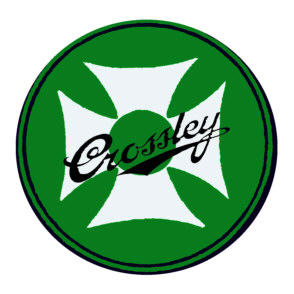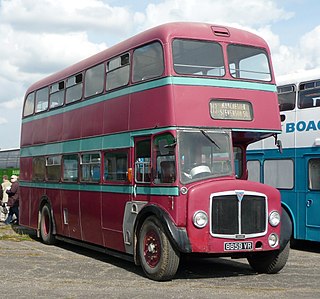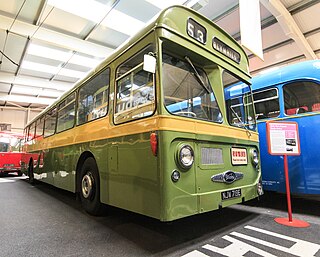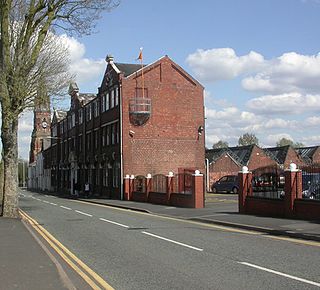
Crossley Motors was an English motor vehicle manufacturer based in Manchester, England. It produced approximately 19,000 cars from 1904 until 1938, 5,500 buses from 1926 until 1958, and 21,000 goods and military vehicles from 1914 to 1945.

The Dennis Dominator was Dennis's first rear-engined double-decker bus chassis, it was launched in 1977.

Seddon Atkinson Vehicles Limited, was a manufacturer of large goods vehicles based in Oldham, Lancashire, England, was formed after the acquisition in 1970 of Atkinson Vehicles Limited of Preston by Seddon Diesel Vehicles Limited of Oldham. In 1974, the firm was acquired by International Harvester, which sold it in March 1984 to the Spanish group Enasa which made it a subsidiary of Pegaso. In 1990, it became part of Iveco which used the brand for various types of specialised vehicles in the United Kingdom. The range of models produced included EuroMover, Pacer and Strato, which are aimed at refuse collection, recycling and construction operators.

The Northern Counties Motor & Engineering Company was an English builder of bus and coach bodywork based in Wigan.

The Leyland Atlantean is a predominantly double-decker bus chassis manufactured by Leyland Motors between 1958 and 1986. Only 17 Atlantean chassis were bodied as single deck from new.

Charles H Roe was a Yorkshire coachbuilding company. It was for most of its life based at Crossgates Carriage Works, in Leeds.

Bristol Commercial Vehicles was a vehicle manufacturer located in Bristol, England. Most production was of buses but trucks and railbus chassis were also built.

The Daimler Fleetline is a rear-engined double-decker bus chassis which was built between 1960 and 1983.

The Dennis Domino was a step-entrance midibus chassis manufactured by Dennis in Guildford, England in 1984 and 1985. It was in essence, a scaled down single-decker version of the Dennis Dominator. Developed for intensive urban work, the Domino was fitted with Perkins T6.354.4 turbocharged engine, Maxwell automatic transmission, front radiator, full air suspension and power steering. It can be regarded as a predecessor of the successful Dennis Dart.

The Dennis Falcon was a rear-engined single-decker bus, double-decker bus and coach chassis manufactured by Dennis between 1981 and 1993. It was mostly built as a single-decker bus, although some express coaches and a small number of double-decker buses were also produced. The total number built was 139, plus one development chassis.

The Bristol RE was a rear-engined single-decker bus or single-decker coach chassis built by Bristol Commercial Vehicles from 1962 until 1982. It is often considered the most successful of the first generation of rear-engined single-decker buses.
Mancunian is the associated adjective and demonym of Manchester, a city in North West England. It may refer to:

The AEC Regent V was a front-engined double-decker bus built by the Associated Equipment Company between 1954 and 1969. It was the last AEC Regent series double-decker model, and was the successor to the AEC Regent III.

The Daimler Roadliner was a single-decker bus and coach chassis built by Daimler between 1962 and 1972. Notoriously unreliable, it topped the 1993 poll by readers of Classic Bus as the worst bus type ever, beating the Guy Wulfrunian into second place. It was very technologically advanced, offering step-free access some 20 years before other buses; as a coach, it was felt by industry commentators to be in advance of contemporary UK designs.

The Mancunian double-decker bus is a type of bodywork for double-decker bus designed by Manchester Corporation Transport Department (MCT) and built on Leyland Atlantean and Daimler Fleetline chassis. A total of 472 Mancunians were ordered by the department between 1965 and 1968 and delivered from 1968 until 1972 with bodywork by Park Royal, East Lancs, Metro Cammell and Charles H Roe. The first 96 buses ordered used a 30-foot (9.1 m) chassis, but the majority were 33 feet (10 m) long. A further 20 were built for Salford City Transport (SCT) but were delivered new to SELNEC PTE.

The Leyland Panther Cub was a rear-engined single-decker bus manufactured by Leyland between 1964 and 1968. A shorter derivative of the Panther built on request to Manchester Corporation Transport, only 94 buses on this chassis were built for operators in England and Wales.

The Leyland Tiger is a heavyweight half-cab single-decker bus and coach chassis built by Leyland Motors between 1927 — 1942 and 1946 — 1968.

Sunbeam Commercial Vehicles was a commercial vehicle manufacturing offshoot of the Wolverhampton based Sunbeam Motor Car Company when it was a subsidiary of S T D Motors Limited. Sunbeam had always made ambulances on modified Sunbeam car chassis. S T D Motors chose to enter the large commercial vehicle market in the late 1920s, and once established they made petrol and diesel buses and electrically powered trolleybuses and milk floats. Commercial Vehicles became a separate department of Sunbeam in 1931.

The AEC Bridgemaster was a front-engined low-height double-decker bus chassis manufactured by AEC.
The AEC Renown was the name given to three distinct forward control bus chassis manufactured by the Associated Equipment Company (AEC) at different periods between 1925 and 1967. All were of the front-engine, rear-wheel-drive layout. The first and third types had two axles, the second had three. Each was intended to be fitted with bodywork by an outside coachbuilder – single deck for the first type, double deck for the third, whilst the second could be bodied in either form.